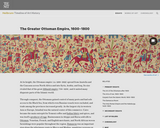
This article examines and explores the greater Ottoman Empire.
- Subject:
- English Language Arts
- Social Studies
- World History
- Material Type:
- Reading
- Provider:
- Metropolitan Museum of Art
- Author:
- Marika Sardar
- Date Added:
- 02/26/2019

This article examines and explores the greater Ottoman Empire.
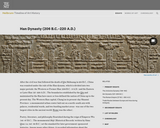
This article traces the history of the Han Dynasty of China from 206 B.C.E. to 220 C.E.

This inquiry leads students through an investigation of the Ottoman Empire during the 16th century by examining the esteemed leader Suleiman the Magnificent. By investigating the compelling question, students are asked to evaluate the postiive and negative impacts Suleiman had on the region. Students create an argument supported by evidence as to the appropriateness of the label "magnificent."

Students will learn basic information about the Incan empire and its downfall through selected readings and discussion activities. Students will futher their understanding regarding the clash of Spanish and Incan society by creating newspapers detailing the events, people, and places during the Spanish conquest of the Incan Empire.

This documentary series was originally aired on PBS. The first episode recounts the history of the religion of Islam. The second episode recounts early Islam's thirst for knowledge. The third episode covers the history of the expansionist Ottoman Empire and its ambitious sultans through the reign of Suleyman the Magnificent.
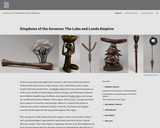
This article examines the development of the Luba and Lunda Empires of central Africa in the late seventeenth and eighteenth centuries.
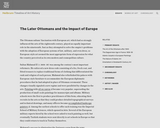
This article examines the lasting legacy of the Ottoman Empire. The Ottoman sultans' fascination with European art, which had so strongly influenced the arts of the eighteenth century, played an equally important role in the nineteenth.
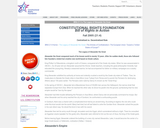
In this lesson, students learn about Alexander the Great and the Hellenistic empire. A set of discussion questions is provided. In an associated activity, students will write a series of letters - one to a person that they have studied in world history and one letter to the American people of today.
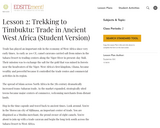
In this lesson, students investigate trade in West Africa's ancient civilizations. They will also explore Islam and how it spread across Africa and how this influenced the development of trade in West Africa.
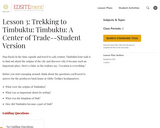
In this lesson, students explore the origins of Timbuktu and how it became a part of Mali.
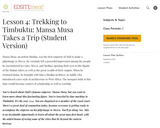
In this lesson, students investigate the life and times of Mansa Musa, especially related to his pilgrimage and decisions he made about his homeland. Students will discuss changes brought about in Mali as a result of his pilgrimage.
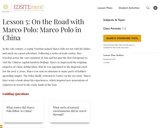
In this lesson, students will explore the Mongol Empire and China at the time of Mongol domination. They will also recognize Marco Polo's role as an official of Kublai Khan.
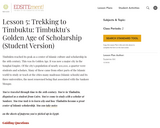
In this lesson, students investigate how and why Timbuktu became a great center of Islamic scholarship.
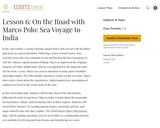
In this lesson, students will summarize the first leg of Marco Polo's return voyage and become familiar with South Asia in the 13th century.
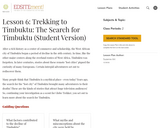
In this lesson, students explain the reasons for the decline and fall of Timbuktu.
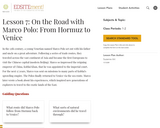
In this lesson, students will become familiar with the geography and early history of Turkey and learn about Constantinople and its historical importance.
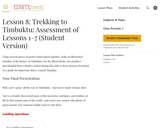
In this lesson, students make an illustrated timeline of the history of Timbuktu, using the notes and information they have gathered throughout the unit.
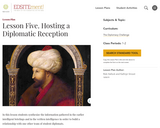
In this lesson students synthesize the information gathered in the earlier intelligent briefings and in the written intelligence in order to build a relationship with one other team of student diplomats
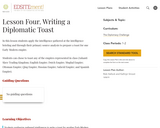
In this lesson students apply the intelligence gathered at the intelligence briefing and through their primary source analysis to prepare a toast for one Early Modern empire.
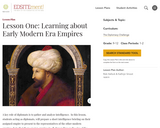
For the curriculum unit The Diplomacy Challenge. Lesson One. A key role of diplomats is to gather and analyze intelligence. In this lesson, students acting as diplomats, will prepare a short intelligence briefing on their assigned empire to present to the representatives of the other modern empires.